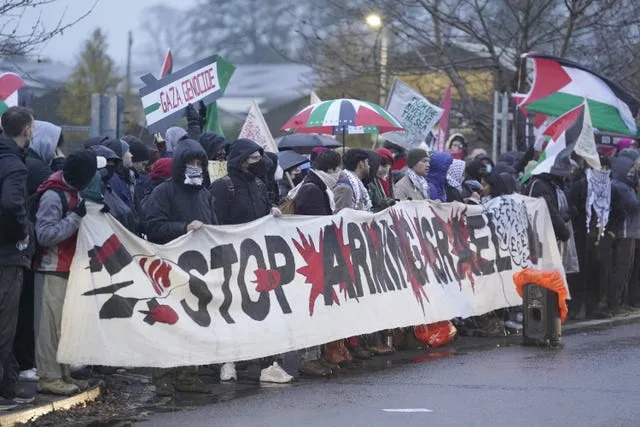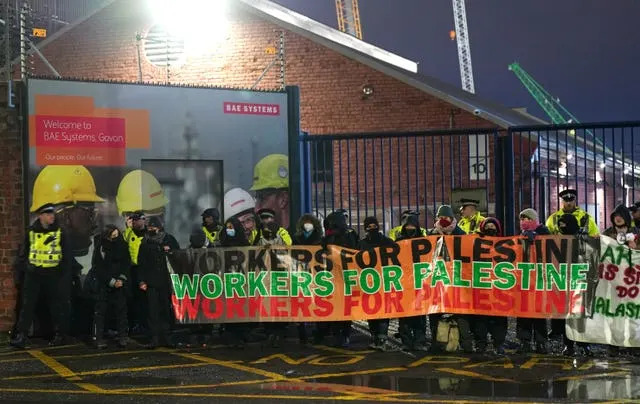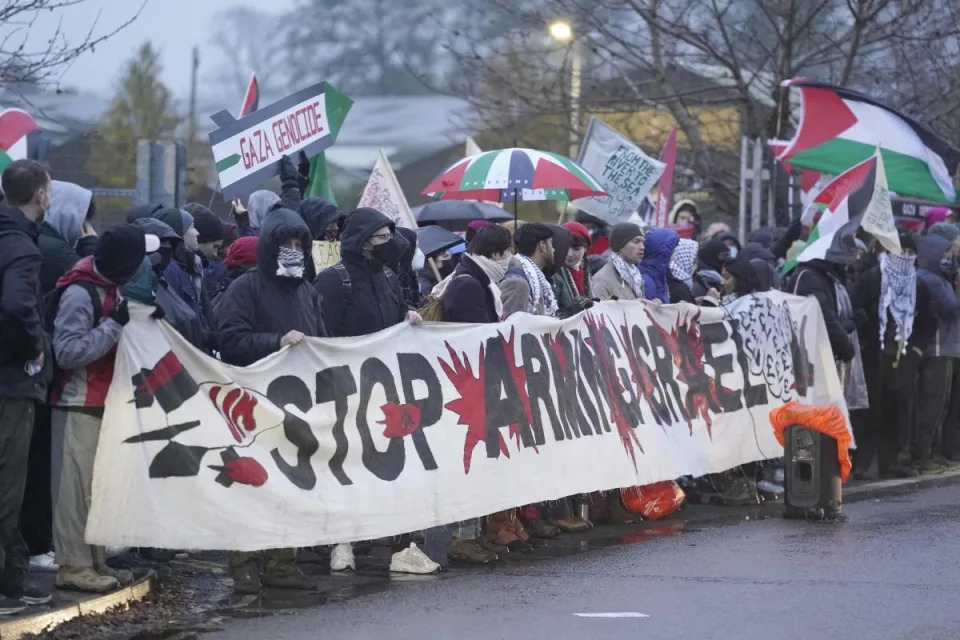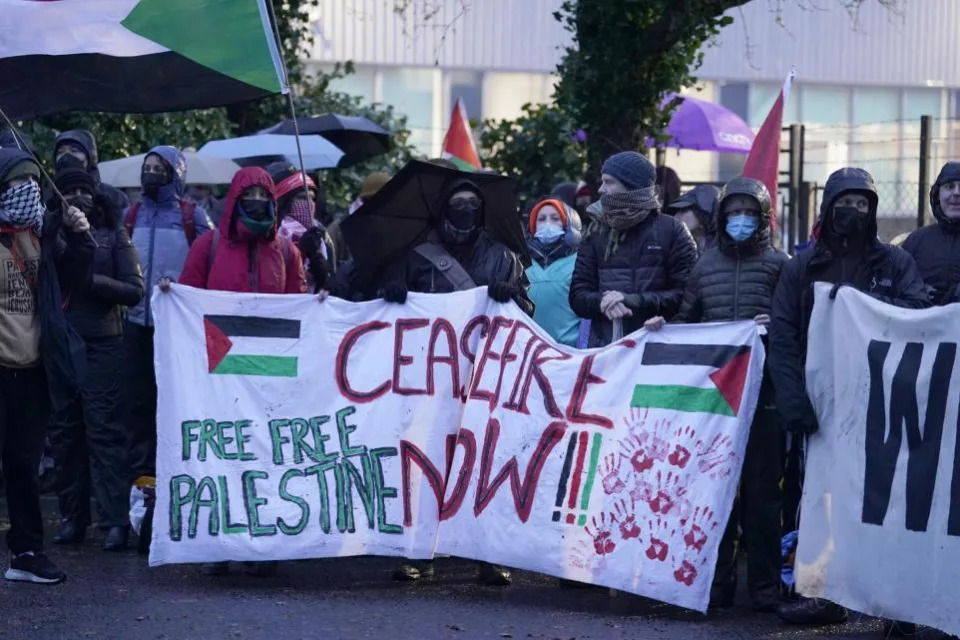“Far from being gesture politics, the unwillingness of the US, UK, and other governments to halt arms sales has emboldened Israel which is pressing ahead with its attack on the Palestinian people in defiance of international law and international outrage.”
Carol Turner
By Carol Turner, Vice-Chair of the Campaign for Nuclear Disarmament & Convenor of CND’s International Advisory Group
If anything can convince the British government, out-going or in-coming, that the UK must halt arms exports to Israel, the Rafah offensive should. Day by day, hour by hour, the toll of Palestinian dead and injured slowly mounts. As far back as December President Netanyahu made clear that military operations would go on throughout 2024. In the midst of the Rafah carnage, and despite the international outcry, he recently reiterated this.
David Cameron has dismissed the idea of halting arms sales as gesture politics. Britain, he claims, supplies ‘less than 1% of Israel’s arms’.i Grant Shapps recently told parliament ‘defence exports to Israel are relatively small—just £42 million last year’.ii This deliberate misdirection is echoed by Labour.
The UK is among the world’s biggest arms exporters, the seventh largest in 2023.iii Arms manufacturers in Britain need a government licence to export military goods, software and technology overseas.iv Applications are evaluated against criteria which include Britain’s obligations under international law and the risk that exported items might be used in the violation of human rights.
No arms export licence should be granted if there’s a clear risk the items: v
- might be used to ‘commit or facilitate’ internal repression or a serious violation of international humanitarian law; or
- would undermine internal, regional, or international peace and security.
Existing licences can be revoked if they don’t match the criteria. But the government has resisted the introduction of post-shipment verification or end-use monitoring of military exports from the UK.vi
BAE Systems is a British company and leading supplier of parts for American F35 fighter bombers that the US supplies to Israel. They are being used against Gaza. Campaign Against Arms Trade and others point out that 15% of every US F35 supplied to Israel is built in the UK.vii
This means Britain is complicit in what’s happening to Palestinians across the Occupied Territories right now.
Individual MPs have spoken up. Leyla Moran, a British Palestinian and a LibDem MP broke the parliamentary consensus by speaking on national media about what was happening to her family there. Labour MPs Richard Burgon and Imran Hussain recently delivered a dossier of evidence on Israeli war crimes in Gaza to the International Criminal Court, evidence compiled from a series of panels they organised in parliament.
In April this year, UK opinion pollsviii showed a majority in favour of banning arms sales after aid workers were killed, including three UK citizens. Plaid Cymru wanted parliament reconvened. Green Party spokespeople have called for the cancelling of all arms export licences, and the LibDems and SNP want suspension.
Last October, Labour MP Zarah Sultana introduced a Private Members Bill calling for a halt to exports to countries ‘where it cannot be demonstrated that arms sold will not be used in violation of international law’ and led a Westminster Hall debate in December. At the end of March, recognising Israel would disregard the UN ceasefire resolution, she coordinated an open letter to Cameron, condemning the government’s failure to act, and calling again for a suspension of arms sales. It was signed by 134 parliamentarians from across the parties, including a Tory peer.
Under pressure from the solidarity movement which, week after week, has taken to the streets in cities and towns across the country, both Conservative and Labour have slowly been forced to increase criticism of Israel. To date, actions have not followed words. Not a single step towards halting British arms exports has been taken by the government, nor has any demand they do so come from the official opposition.
CND takes this issue very seriously indeed. Israel is one of only nine nuclear-armed states in the world, and the only one that doesn’t admit to having them. Israel has not signed the nuclear Non-Proliferation Treaty designed to limit their spread and secure nuclear disarmament.
The nuclear risks involved in the war on Gaza may not be as remote as they seem. Since the October attack by Hamas, a few Israeli politicians have floated the prospect of using nuclear weapons against Iran or Lebanon. Most of the drones and missiles Iran launched against Israel in April were taken out before they reached their targets. One missile was not. It successfully reached its target, Nevatim in southern Israel, near the Dimona nuclear facility.
Far from being gesture politics, the unwillingness of the US, UK, and other governments to halt arms sales has emboldened Israel which is pressing ahead with its attack on the Palestinian people in defiance of international law and international outrage.
The next 5 weeks of general election campaigning is an opportunity to make our voice heard by every candidate in every constituency across the country. CND members should act, and act now.
i David Cameron, Sunday with Laura Kuenssberg, 12 May 2024 at https://www.bbc.co.uk/iplayer/episode/m001z828/sunday-with-laura-kuenssberg-arms-to-israel-gaza-protests-eurovision
ii Grant Shapps, Hansard, House of Commons, 20 November 2023 at https://hansard.parliament.uk/Commons/2023-11-20/debates/776C2068-C460-402F-8826-ECAE91256A56/UKArmsSalesToIsrael#contribution-7ACCD6F1-79D9-4859-9429-EFA71569E209
iii D Pieter et al, Trends in International Arms Transfers 2023, SIPRI at https://www.sipri.org/sites/default/files/2024-03/fs_2403_at_2023.pdf
iv Louisa Brooke-Holland, An introduction to UK arms exports, House of Commons Library Briefing, 24 January 2024 at https://commonslibrary.parliament.uk/research-briefings/cbp-8312/
v Louisa Brooke-Holland and Nigel Walker, Arms export licences for sales to Israel, Housse of Commons Library Briefing, 7 December, 2023 at https://researchbriefings.files.parliament.uk/documents/CDP-2023-0223/CDP-2023-0223.pdf
vi Committees on Arms Export Controls (CAEC) joint report ‘Developments in UK Strategic Export Controls’, 9 January 2024 at https://www.gov.uk/government/publications/caec-report-on-uk-strategic-export-controls-government-response
vii BAE Systems, F-35: a trusted partner on the world’s largest defence programme, at https://www.baesystems.com/en/product/f-35-lightning-ii
viii YouGov polls in March and April, reported by the Guardian and others, showed majority support for a suspension of arms sales to Israel, see for example https://www.theguardian.com/world/2024/apr/03/majority-of-voters-in-uk-back-banning-arm-sales-to-israel-poll-finds In May, YouGov found opinion had remained static: ‘56% would support the UK ending the sale of arms to Israel for the duration of the conflict in Gaza. Only 20% would oppose this move’ reported https://yougov.co.uk/politics/articles/49366-british-attitudes-to-the-israel-gaza-conflict-may-2024-update
WeThink digital polling, reported by Byline Times in April, found 68% of those surveyed would support a ban, compared to 32% who were opposed https://bylinetimes.com/2024/04/03/brits-want-the-uk-to-ban-arms-sales-to-israel-but-its-political-parties-arent-listening/














